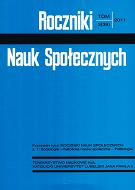Public Sociology jako nowa subdyscyplina naukowa według Michaela Burawoya
Public Sociology as a New Scientific Subdiscipline according to Michael Burawoy
Author(s): Maciej HułasSubject(s): Social Sciences
Published by: Towarzystwo Naukowe KUL & Katolicki Uniwersytet Lubelski Jana Pawła II
Keywords: public sociology; public debate; sociological subdisciplines; moral obligation of sociology; instrumental knowledge; reflective knowledge
Summary/Abstract: Since sociology deals with the description of society as an abstract whole concept, its cultivation is only possible if sociologists are able to follow sociological imagination - the ability of distancing itself from the actual conditions of life perceived by each person subjectively. The sociological imagination is an open-space perception and understanding of human needs, attitudes, aspirations, and preferences. Its openness involves methodical openness as well. The sociological imagination confronts the difficult task of contemporary sociology to reach what is its proper object. Under the present circumstances it is the people subjected to transformations, caused by globalization processes. One effect of these transformations is to push the public sphere socialitas into the background by international capital and state administration. Burawoy’s postulate of including a new sociological sub-discipline called organic public sociology into the established sociological division is an answer he gives to the question: how is contemporary sociology to reach and animate individuals and groups living on the fringe? Public sociology defined by Burawoy is a project that aims at making the public sphere more vital by awakening civil awareness of how to make use of their status as state citizens in communities. It is also to be treated as an attempt at striving to establish contact between sociology and society and keep in touch with both. Burawoy writes from the vantage point of those below, which makes his narratives sound neo-Marxist in a sense. What is striking in his position is searching for moral strongholds of sociology. It is to be seen both in the line in which he describes the global role of American sociology as a frame of reference for sociology cultivated outside the USA, and where he enhances the status of sociological reflexive knowledge. Besides, the strong moral commitment and deontology that resonate within every inch of Burawoy’s narratives compose the backdrop of public sociology. The project of public sociology presented by Burawoy in 2004 split the sociological environment into three groups: keen adherents, partial adherents, and staunch opponents. This means that the arguments presented by him in different ways appeal to the imagination of those concerned and, as any other arguments, have strong and weak points. The project elaborated by Burawoy undoubtedly proved to be successful if we consider the international debate it initiated, the debate on public sociology and the role of contemporary sociology in general.
Journal: Roczniki Nauk Społecznych
- Issue Year: 39/2011
- Issue No: 3
- Page Range: 29-67
- Page Count: 39
- Language: Polish

